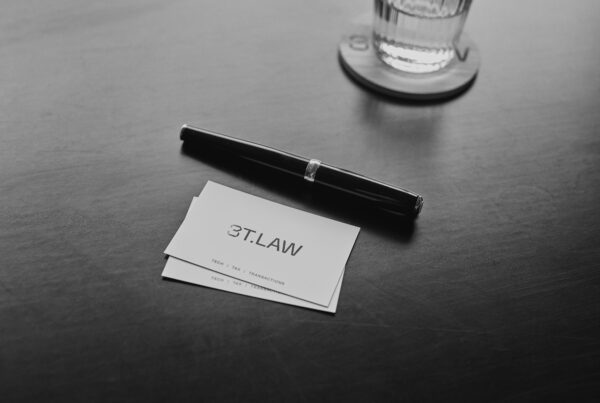Corporate Law – Changes and Need for Action for Associations as of 2024
The registration of an association as a “registered association” (e.V.) in the association registry (Vereinsregister) is not mandatory. There are also unregistered associations. With the enactment of the MoPeG Act (Gesetz zur Modernisierung des Personengesellschaftsrechts; Law for the Modernization of Partnership Law) effective as of 1 January 2024, relevant changes in the corporate law for association law have emerged. Notably, the term “association without legal personality” in § 54 BGB (German Civil Code) and the distinction between economic and non-economic associations without legal personality are new to the statutory law. The statutory changes could also lead to a registration obligation for unregistered associations.
1. Key Principles of German ssociation Law
An association is a permanent union of members pursuing a common purpose. Mandatory organs of the association are the executive board and the general assembly. Other organs are possible (such as an advisory board, sometimes also an internal arbitration tribunal).
Legally, distinctions are made between (i) the ideal (non-economic) and the (rarely encountered) economic association and (ii) whether an association is registered and thus clearly a legal person (“e. V.”) or unregistered (previously misleadingly referred to as “non-legal association”).
If an association demonstrably pursues charitable, benevolent, or ecclesiastical purposes (according to its evidence and evidenced by the specific use of the association’s funds!), recognition of the association as tax-exempt for corporate and trade tax purposes is possible, whether registered or not. A tax-exempt association engaging in economic activities (such as merchandise sales, paid events, food and beverage operations, etc.) may be partially taxable if the de-minimis thresholds are exceeded (tax liability with the association’s “economic” business operations).
2. Changes in Association Law due to the MoPeG
The “century reform” of partnership law through the MoPeG effective as of 1 January 2024 also affects the law of associations. This is due to the amendment of § 54 BGB and also changes in partnership indirectly affecting associations.
(1) Applicable Law: Distinction between economic and ideal association
For the unregistered economic association (which has not obtained legal capacity through a state concession), the amended statutory provisions for the the GbR (Civil Law Partnership) apply according to the new version of § 54 para. 1 sentence 1 BGB also apply to the economically active unregistered association.
For the unregistered “ideal” association the provisions for the registered association apply accordingly, § 54 para. 1 sentence 2 BGB.
Thus, a distinction is made whether an association without legal personality is oriented towards an economic purpose (treated then as a GbR) or pursues idealistic non-profit purposes (treated then according to association law).
(2) Assets of the Association without Legal Personality
Priot to 2024, assets of the unregistered association, like the GbR, were held in joint ownership by all members.
Since 2024, implementing the BGH (Federal Court of Justice) case law since 2001, the GbR is expressly also the bearer of rights and obligations, provided that the GbR does not limit itself to an internal society (but acts towards third parties).
This implies that the association without legal personality can also explicitly own assets.
(3) Personal Liability in the Association without Legal Personality
Members of the unregistered association were sometimes personally liable, for example, when legal transactions were concluded in the name of the association or for membership fees of other members. This liability was generally governed by the principles of the GbR.
Since 2024, this personal liability only exists for members of economic associations without legal personality. Furthermore, § 54 para. 2 BGB limits liability as follows: From a legal transaction made on behalf of an association without legal personality to a third party, only the acting person is personally liable; if several act, they are jointly and severally liable.
The unregistered association has the option of registering in the association register at any time. The personal liability of the association’s members ceases in this case.
(4) New Rules for Defective Resolutions
Unlike for corporations, there were previously no statutory provisions for defective resolutions of the members’ or shareholders’ meeting for associations or partnerships. Resolutions of the general assembly that were made in violation of the provisions of the statutes or applicable law were always void. There was no distinction according to the “intensity” of the respective violation. Moreover, lawsuits against resolutions, if no other regulation was made in the statutes, were possible indefinitely. The only time limit was forfeiture (more precisely, in German: Verwirkung).
The new law on defective resolutions in partnership law is modeled on that of the German stock corporation (Aktiengesellschaft). A distinction is made between the mere contestability of an unlawful (but not void) resolution and the nullity of a resolution. Against unlawful resolutions, association members (unless otherwise regulated in the statutes) must now timely file a contestation lawsuit. The law provides for a three-month period for filing a contestation lawsuit against resolutions unless the statutes provide otherwise. Only in cases of serious violations are shareholders’ resolutions void.
Differences from stock corporation law exist regarding the statutory grounds for nullity. According to § 714a para. 2 no. 1 BGB new version, a resolution is void if it is incompatible with mandatory law. In formalistic stock corporation law, on the other hand, a violation of formalities of resolution leads to nullity, as well as other reasons. These differences are due to the fact that partnership law allows a higher degree of contractual freedom. Unlike stock corporation law, the right to contest does not depend on whether the association member appeared at the general assembly and objected to the resolution. In stock corporation law, on the other hand, an objection must be recorded in the minutes of the general meeting to secure the right to contest in a contestation lawsuit.
Due to the extensive contractual freedom, it is up to the association to incorporate the new law on defective resolutions into their statutes or modify it.
(5) Information Rights
Until now, there were no legally anchored information rights for association members. As of 2024, members of unregistered economic associations now have legally anchored information rights against the association. Members of such associations can now demand all information they need to exercise their membership rights, inspect the association’s documents, and request information about the association’s affaiirs, generally at any time, not just in a general meeting.
This is due to the liability. Members of unregistered economic associations are personally liable in individual cases, which is why they should be able to have a comprehensive insight into the company’s documents to control their risk. In contrast, members of “ideal” associations are not liable for the association’s debts. Therefore, they also do not need a corresponding extensive right to information.
It should be noted that this right to information cannot be restricted in the association’s statutes.
3. Differences between the Unregistered and the Registered Association
What significant differences remain from 2024 between the association without legal personality (not registered in the association register) and the registered association?
(1) Formation
For the formation of the unregistered association, two persons are sufficient. With the election of an executive board, the decision-making capacity within the association is ensured. The statutes of the unregistered association do not have to comply with any formal requirements, which facilitates the founding of the association. However, written form is advisable for proof and verification purposes.
If the association without legal personality seeks recognition as tax-exempt, written statutes (complying with the requirements of the tax administration) are always required.
(2) Liability of Members
Since 2024, only members of economically active unregistered associations are personally liable. This personal liability applies regardless of whether the person is a board member or has the right to represent the association. This personal liability is limited by § 54 para. 2 BGB and does not apply to the (unregistered) ideal association.
Members and the association should check whether remaining personal liability risks can be avoided by insurance coverage or whether registration in the association register and thus a limitation of liability is indicated.
(3) Ability of the Association without Legal Personality to be Registered as Owner of Real Estate?
The ability of the association or legal personality to be registered in the land register is tricky:
Before an amendment of § 47 para. 2 GBO (Grundbuchordnung, land register regulations) in 2009, unregistered associations were entered in the land register under their name only by some land registry offices. Until a court decision in 2016 it was unclear whether this was compliant with statutory law. Mostly, unregistered associations, were only entered in the land register if also the registration of all their members was requested. If associations rejected this because of the number of their members, registration was denied.
As of 2024, it remains unclear whether an associations without legal personality may be registered in the land register. Some experts take that associations would now first have to either register in the association register (as an ideal association) or, in the case of economic purposes, depending on the individual case, as an eGbR in the partnership register or as an OHG in the commercial register in order to be eligible for land register registration. According to other views, an association without legal personality is either no longer eligible for land register registration or continues to be (regardless of the changes for the GbR) only when registered naming all its members.
4.Conclusion: What Associations and Founders Should Now Consider
The unregistered association (association without legal personality) appears as a legal form particularly for short-term idealistic purposes without economic activity. If the goal of the association is a longer-term purpose commitment, registration is recommended for reasons of liability minimization and practicability.
With the enactment of the MoPeG effective as of 2024, registration appears particularly advisable due to factual or actual registration obligation, for example, for real estate or GmbH share ownership by the association, at the latest in the event of changes in ownership to be entered into a respective register.



